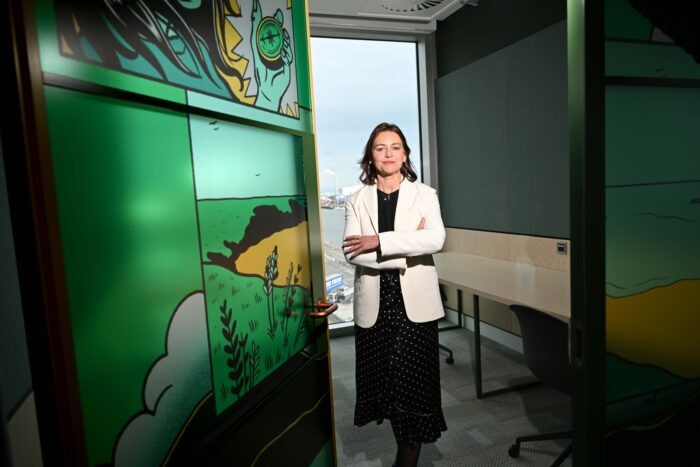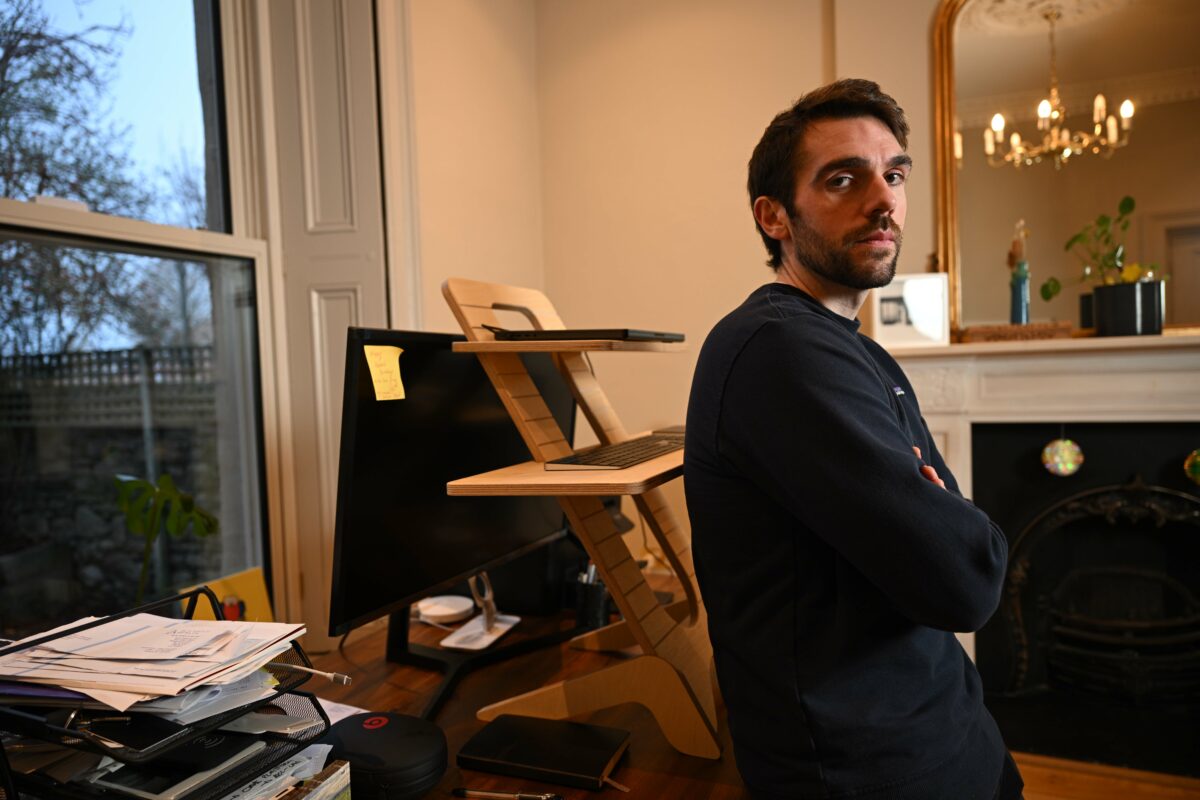Conor Sheridan is a singular character.
Like most entrepreneurs, he thinks differently to most people.
What seems obvious to Sheridan can often seem odd, perhaps contrary, to other people. And vice versa.
He looks at a restaurant and sees a spreadsheet. He looks at a spreadsheet and sees ways of improving a restaurant. It is just the way he works.
I have spoken to Sheridan twice in the past number of months. Both conversations were informative, particularly when it comes to understanding the banking landscape in Ireland.
But to try and understand Sheridan, you need to know the backstory.
Sheridan worked as a strategist with Accenture before doing a stint as a fund manager with Davy. Finance and strategy course through his veins.
But his heart is with restaurants and the hospitality industry. While working in finance, he met with different brands about bringing a restaurant franchise to Ireland, and with several Irish brands about rolling out outlets. Unconvinced about either option, he decided to go it alone.
The result was Mad Egg, a mid-market chicken chain that he launched with the restauranteur Stephen O’Reilly. The first outlet opened in 2018, and within 14 months, the business had revenues of €6 million. Today, the chain stretches to five outlets.
Given his background, the more he learned about running a restaurant, the more he realised that the process could be improved.
He began building a dashboard and models to see if he could improve the performance of his operation. The idea was to help manage costs by tracking everything from stock management to staffing to the performance of every product on the menu.
Nory was born to sell this software to other restaurants.
Investors were enthused. The business raised a €2 million pre-seed round in 2021, just months after it was launched, and late last year, it raised a further €7 million to develop its technology and to drive it into new territories.
But this is just the start of his ambitions.
Sheridan wants Nory to become a one-stop shop for restaurateurs – providing everything from back-end support to finance.
The latter point is important and came from his own personal experience.
As he told me last week, Sheridan was facing a “fork-in-the-road” moment. Mad Egg was blossoming and Sheridan and O’Reilly wanted to roll out the concept further. That required capital, and Sheridan did not want to dilute his equity by selling out to a fund. The banks, meanwhile, were of little help.
The process of getting a bank loan was too tedious, too lengthy, too difficult. Lenders did not understand the nature of the business model that Sheridan was selling.
He reckoned he was not the only restaurateur facing a similar problem. So, he decided to do something about it.
Nory Capital, a new product line with Sheridan’s wider Nory group, has now gone live, offering restaurant operators loans of between €1,000 and €4 million. Nory is charging interest rates in the region of 5 per cent, and Sheridan maintains that most loan applications will be processed within 24 hours.
YouLend, a British lending platform that has a £4 billion (€4.64 billion) credit line with JP Morgan, is providing the money and the regulatory licence, while Nory is using its software products to crunch the numbers and decide whether to lend the money.
Much of the initial interest is coming from mid-market restaurant groups in the UK and the US.
I contacted Sheridan days after our interview was published to see how the finance unit was progressing. Already, the business has lent €2 million. The loans are for growth purposes, as opposed to working capital.
Sheridan spotted a gap in the market, a gap that has not been serviced by the traditional lenders.
And he is not the only one to see it. Just look at CapitalFlow, the alternative lender headed by Ronan Horgan, and Santiago Capital, a property lender that has recently branched into SME loans. Or Wayflyer, the e-commerce lender that has grown in both size and scale despite cutting back last year.
Scarred by the financial crisis, the Irish banks are risk-averse. It was a calamitous overexposure to property that triggered their demise. But the pillar banks are seriously cautious about business lending.
The banks talk a good game when it comes to backing Irish businesses. However, the reality on the ground is different. Most business owners I talk to are increasingly frustrated by their experience with the main banks.
Put bluntly, the banks don’t seem to understand the nature of their business models, particularly when it comes comes to retail or hospitality. Many bankers are still demanding security over property as recourse for loans.
On the face of it, AIB and Bank of Ireland can boast about higher lending to businesses. AIB’s new corporate and SME loans climbed an impressive 18 per cent in 2023 to €5 billion. Bank of Ireland’s business lending rose to €3.4 billion from €3.2 billion.
Yet most of this is to bigger corporates. Actual advances to small firms continues to decline as it has pretty much for over a decade, according to the Central Bank’s statistics.
Gross lending to SMEs fell €174 million last year to €4.1 billion across all banks and lenders. Included in the headline figure are loans to the property and construction sectors.
The rate of repayments exceeds that of new advances, an indication that SMEs are nervous about the amount of debt they are carrying and cautious about borrowing more.
The most alarming figure in the Central Bank data is that the total amount of SME loans to the banks’ balance sheets stood at €17.8 billion at the end of 2023, a staggering drop on the €62 billion recorded in 2011.
The 2011 number was clearly too high. However, the 2024 number is way too low.
Conor Sheridan is lending money to businesses that traditional banks are afraid of. And in the long term, that is going to hurt the banks. When you separate the rhetoric from the reality, you can see why he saw the opportunity in the first place.

Elsewhere last week, we launched Brand Matters, a new podcast series hosted by Alison Cowzer and sponsored by Whitney Moore. The series will run over seven weeks and focuses on brands and brand development. In episode one, Alison spoke to Debbie Byrne, who has two key roles within An Post.
As managing director of its retail business, she is responsible for rolling out its suite of financial products. But she also has responsibility for An Post’s strategic brand development. In this episode of Brand Matters, she explains the symbiotic relationship between the two roles. She also talks about transitioning the An Post brand, stakeholder capitalism, and the importance of doing the right thing for the right reason.
I examined Irish real estate funds (Irefs), a tax-efficient structure established in 2017 to channel foreign investment into Irish property. More than €28 billion has been pumped into Irefs since they were established. Based on new data, I examined how much tax they are paying, and what asset classes (and locations) they are investing in.
Stephen continued his exploration of the rise of the right in Ireland. This week, he looked at the role of Sinn Féin. After all, trying to balance strict border controls with a duty to treat asylum seekers humanely seems nearly impossible with a right-learning parliament – should they come to power, Sinn Féin will have no choice but to deal with these realities.
Irish participants in a global parliamentary group critical of China came under “reconnaissance attack” by Beijing-affiliated operatives, according to US investigators. TDs and Senators are expecting more information in the coming days. Thomas, Michael and Niall had the story.


